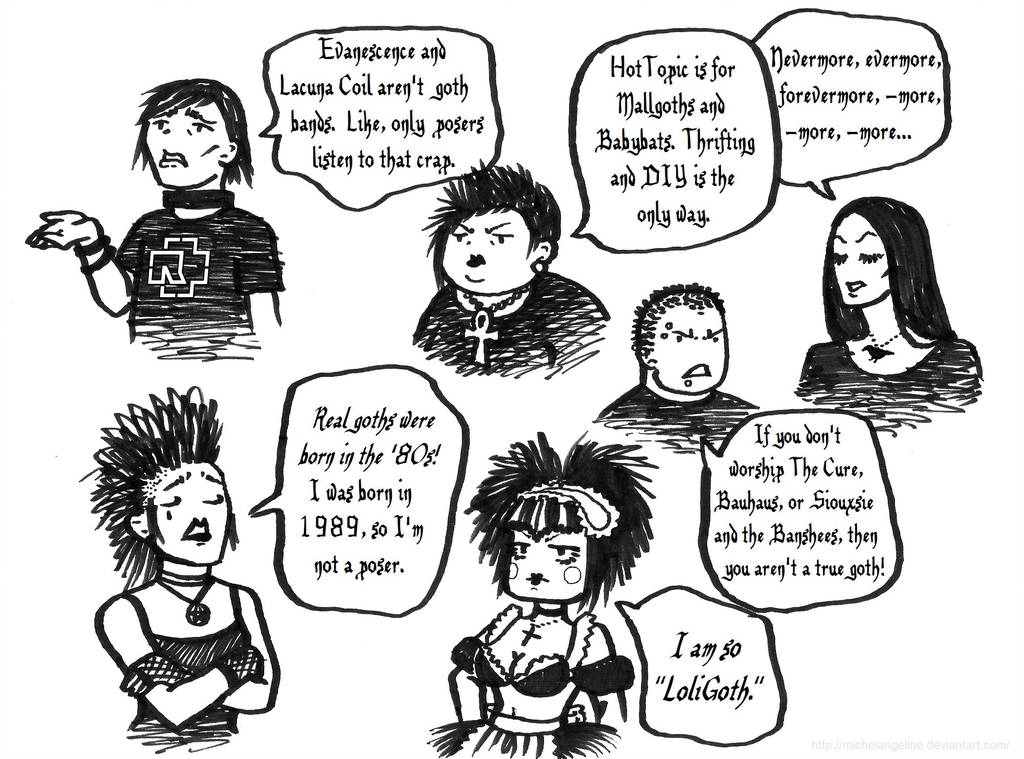“You’re not Goth because…” Take your pick: Because you like a particular band/genre, because of your personal religious beliefs, because your aesthetics aren’t “Goth enough,” or even because you don’t know the entire history of the subculture. Whatever the case may be, if you’ve ever been told this or even said it yourself, congratulations. You’ve had an encounter with one of the most annoying, self-righteous pricks in the scene: The elitist.
What is an Elitist?
An elitist, by definition, is “a person having, thought to have, or professing superior intellect or talent, power, wealth or membership in the upper echelons of society.” Elitists exist in every culture, subculture, scene and group. The Gothic elitist is someone each of us has run into at least once. He’s the guy who is so engulfed in the scene that he follows this invisible Gothic rule book to the T. He thinks anything outside of 80’s Goth music isn’t really Goth, he’ll shun anyone who doesn’t know the history of the scene, he’ll judge you by the way you’re dressed if you’re not “Goth enough,” and if you listen to any other genres other than Goth then you’re a poser. The possibilities are endless. The irony, in fact, is that the Gothic elitist has basically become everything that they claim to be against: A self-righteous, upper-class snob with their nose in the air, disrespecting anyone who doesn’t dress like them and puts down anything that doesn’t conform to their standards.
(In all honesty, I found myself becoming an elitist in my early twenties, due to my encounters with other elitists. I started monitoring the music I was listening to, and also making sure that my style of dress was very in-your-face Gothic. I didn’t want to go out and not be obviously recognized as a Goth, and I wouldn’t allow myself to enjoy certain artists or genres, simply because I didn’t want to appear to be a poser. Couldn’t like music that Goths aren’t “supposed to” enjoy. But thankfully, I grew out of that as time progressed.)
The Problem Elitism Causes
Aside from the fact that elitists are just all-around assholes, it causes a real problem in the scene. The biggest problem being that elitism stands for so many things that the Goth scene doesn’t really condone, so to speak: Bullying, judging others, and conformity to name just a few.
If there’s one thing all Goths have in common it’s that we all seem to have a history of being bullied or abused in some fashion. Picked on in school because of our weight, religion, social status, or just not being “cool enough” for the in-crowd. That’s what drew many of us into the Goth scene to begin with. I know it’s true in my case. Now imagine someone who’s been bullied and rejected all their life, thought the Goth scene looked cool and was familiar with some of the music, and they felt they could seek refuge with the outsiders. Instead, they’re met with the same hostility and disrespect that they got everywhere else. That person has been ousted by those who were ousted themselves, basically adding to that feeling of rejection. Oh, the hypocrisy!
Individualism is also something that’s extremely celebrated in the Goth scene. That’s why many of us came in as well: the refusal to conform to the standards of the mainstream thought and fashion. We want to dress the way we want, listen to the music we want, and if you don’t like it then tough. So what happens when an elitist follows that invisible Gothic rulebook? They will only dress in what they deem “Gothic” fashion, and have a very limited catalogue of “real Gothic” music, and will frown upon (big surprise) anyone who doesn’t conform to their ways. So they’ve put themselves in a box smaller than the one they were trying to escape. And if all Goths are supposed to conform to this standard and be the same, individuality is lost.
Closing Thoughts
I think Aurelio Voltaire said it best in his book, What is Goth?: “It’s whatever you want it to be.” For some people in the scene, they’re Goth because they just like the look. Others are heavily into the music scene. More identify with the fashion, music and philosophy in the scene. Whether Goth runs through the blood or just skin deep, each of us should be able to listen to and dress in whatever we want, without getting stopped by the Goth police.
Credits:
Reverend Leviathan photo: JT Hanke



February 16, 2019
“Mephistopheles is not your name…. I know what you’re up to just the same” -Did Sting set you up with this or what???
July 2, 2020
Im a little bit with both sides of the fence, but I think its important to be constructive. Intimidation tactics and so on doesnt provide a healthy debate in order to understand the issue better. Its not important to always be right, but to change your mind based on what you know. If that implies that if people may not like it, than sometimes…meh. A minority opinion isnt necessarily bad if its based on facts.
Ive only read Gothic Charm School, so far, and watched a few documentaries. So I cant say Im an expert. But I know other writers will disagree with the notion that ‘goth is whatever you want it to be’. The basics are always there, but there does seem to be a room for interpretation within this framework? Atleast, my impression.
August 1, 2020
I consider myself to have a dark style of dress. I don’t consider myself goth. So maybe I can come at this from a neutral point of view.
You are correct about elitism being a cancer. People might want to think in terms of the goth newbies: They’re feeling like outcasts already, which is one of the things drawing them to goth. Making them feel unworthy of joining the subculture isn’t going to help them, and in some cases may even drive them to a darker place (e.g. self harm). It was easy for an ’80s kid to become goth if s/he wanted, in the sense that all the so-called goth music was current, and the history was basically the present. It wasn’t 30-40 years removed, as it is today.
At the same time, goths in the ’80s were reviled for being outsiders. I think some of the elitism is a sort of projection, of making the uninitiated feel “less than,” as society makes goths feel in general.
The whole subculture is full of contrarian nonsense. The goth godfathers and godmother – Bauhaus, Siouxsie, the Sisters’ Eldritch, the Cure’s Smith – all reject the goth label. An article I read asked if that made them goth after all, being “too cool to be goth.” So…does that make me goth then, since I reject the label? Are we defined by what we reject, or by what others see in us, as opposed to self-definition? And more importantly, who the hell has time for such existential nonsense? …And that’s just one facet of goth contradictions. One could find many others. Being a goth elitist is being the self-styled overlord of hypocrisy.
A subculture needs two things, I think: definition and growth. Elitists favor the former and refuse to acknowledge the latter. If they had their way, I suspect, goth would have died out with the ’90s.
I think all newbie goths should take a kind of crash course in the musical and cultural history of goth. As people far removed from the post-punk scene, they will likely not find much to like in the music, and that’s okay. So long as they gave it a chance and learned something about what they want to be a part of, they will emerge as more educated human beings, and thus better goths. The goth subculture should try to preserve its roots. But there is where it stops. If a kid wants to listen to Marilyn Manson, tried and doesn’t like Siouxsie or the Cure, and knows how the goth subculture came to be, then that kid is goth to me.
May 30, 2021
I dont think elitism is really that big in the subculture, but many of them are really passionate about the music and the subculture and Where its coming from. Most goths Ive encountered dont seem to have much of a problem if you listen to music outside of goth. I believe most are just trying to educate, but some tend to have this smug attitude, which is a problem.
I consider goth to be a music based subculture, though. The music is part of it, and politely pointing this out just means that they trie to educate people on facts, and thats not elitist.
If we are talking about bullying or intollerance, thats a whole different side of the story